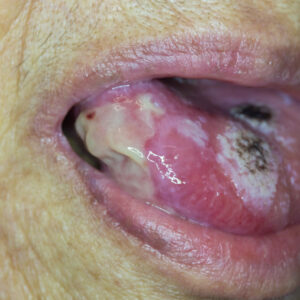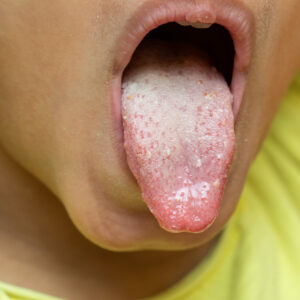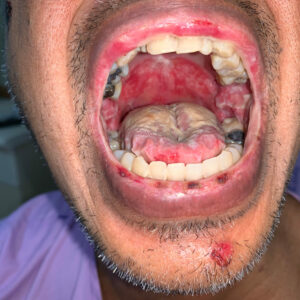Mucositis is a medical term for sores, ulcers and inflammation in your gastrointestinal (GI) tract. Our GI tract includes our mouth, oesophagus (food pipe between our mouth and stomach), stomach and bowels. Many treatments for lymphoma can cause mucositis which can be painful, increase your risk of infection and bleeding, and make it difficult to talk, eat or drink.
This page will discuss mucositis of the mouth and throat. For more information on mucositis affecting your bowels, which can cause diarrhea or constipation, please click here.
What is mucositis?
Mucositis can result in painful, broken areas of the mucous membranes (lining) of your mouth and throat. These broken areas can bleed, particularly if you’re thrombocytopenic, or it becomes infected. The risk of mucositis becoming infected is higher if you are neutropenic, however infection can still happen when your immune system is working properly.
Mucositis may also be swollen, darkened, red or white areas in your mouth and throat, even if the mucous membranes are intact.
Definitions
Thrombocytopenic is the medical term for when you have low platelet levels. Platelets help our blood to clot to prevent bleeding and bruising.
Neutropenic is the medical term for when you have low neutrophils. Neutrophils are a type of white blood cell and are the first cells in our body to fight infection.
Causes of mucositis
Unfortunately, some treatments for lymphoma not only destroy the lymphoma cells, but can also attack some of your good cells. The main treatments that can cause mucositis of your mouth and throat are listed below. Click on the headings to learn more.
Chemotherapy is a systemic treatment that works by destroying cells that are growing or multiplying quickly. Systemic means that it travels through your blood stream, and so can affect any area of your body. This makes if very effective at treating many types of lymphoma. However, many of our healthy cells also grow and multiply quickly. The cells in our GI tract are some of those fast-growing cells.
Chemotherapy cannot tell the difference between the cancerous lymphoma cells and your healthy cells. As such, the chemotherapy can attack the cells in your GI tract resulting in mucositis.
Mucositis usually begins a few days after treatment and disappears within 2-3 weeks after you finish treatment. Your lowered immune system (neutropenia) and thrombocytopenia caused by your chemotherapy can also make mucositis worse, with the risk of bleeding and infections.
Radiotherapy is more targeted than chemotherapy, so only affects the small area of your body having the treatment. However, radiotherapy still cannot tell the difference between cancerous lymphoma cells and your healthy cells.
When radiotherapy is targeting lymphoma near your mouth or throat, such as lymph nodes in your head and neck, you can get mucositis.
Immune checkpoint inhibitors (ICIs) such as nivolumab or pembrolizumab are a type of monoclonal antibody. They work a little differently to other treatments for lymphoma.
All of our normal cells have immune checkpoints on them. Some of these are called PD-L1 or PD-L2. These checkpoints help our immune system to recognise our own cells. Cells with checkpoints are left alone by our immune system, but cells without the checkpoints are identified as dangerous, so our immune system destroys the cells that don’t have the checkpoints.
However, some cancers including some lymphomas adapt to grow these immune checkpoints. By having these immune checkpoints, the lymphoma can hide from your immune system.
Immune checkpoint inhibitors work by attaching to the PD-L1 or PD-L2 checkpoints on the lymphoma cells, and by doing this, the immune checkpoint inhibitor hides the immune checkpoint from your immune system. Because your immune system can no longer see the checkpoint, it can recognise the lymphoma cells as dangerous and therefore destroy them.
Because these checkpoints are also on your healthy cells, sometimes treatment with immune checkpoint inhibitors can cause your immune system to attack your good cells too. When your immune systems fails to recognise the cells in your GI tract as normal, they can result in an auto-immune attack where your immune system fights your own healthy cells, causing mucositis. This is usually temporary and improves when treatment stops. In rare cases, immune checkpoint inhibitors can cause longer term auto-immune conditions.
Stem cell transplants are used as a rescue treatment to save your bone marrow after you have very high doses of chemotherapy.
Mucositis is a very common side-effect when you have a stem cell transplant because of the high dose chemotherapy. Sucking on ice for about 20minutes before and after some chemotherapies given for stem cell transplants can help reduce the severity of mucositis. Ask your nurse about this if you are having a stem-cell transplant
Preventing mucositis
As with most things, prevention is better than a cure. Unfortunately, due to the way some treatments work, you may not always be able to prevent mucositis. But there are ways to prevent it getting severe and managing the risks of bleeding and infection.
Dentist
Before you start treatment it can be a good idea to see a dentist if you have any concerns about your teeth. This may not always be possible, depending on your subtype and grade of lymphoma, however it is worth asking your haematologist or oncologist about it.
Any problems you have with your teeth or gums could get worse during treatment and put you at a higher risk of infection, which will make your mucositis more painful and difficult treat. Infections may also mean you have to delay treatments.
Some dentists specialise in treating people with cancer. Ask for recommendation or referral from your haematologist or oncologist.
Mouth care
Many hospitals will recommend a specific type of mouthcare solution for you to use. In some cases, this may be salty water with bicarbonate soda in it.
If you have dentures, take these out before rinsing your mouth.
Clean dentures before putting them back in your mouth.
Make your own mouthwash
You can make your own mouthwash if you prefer.
Boil some water and then let it cool.
Ingredients
- One cup (250mls) of the cooled boiled water
- 1/4 of a teaspoon (tsp) of salt
- 1/4 teaspoon (tsp) of bicarbonate of soda.
Use a measuring spoon to measure the amount of salt and bicarbonate of soda. If you make it too strong it may sting your mouth and make your mucositis worse.
Method
- Put the salt and bicarbonate of soda in the cooled water and stir.
- Take a mouthful – DO NOT SWALLOW.
- Rinse the water around your mouth and gargle for at least 30 seconds.
- Spit the water out.
- Repeat 3 or 4 times.
Do this after every meal and before bed – at least 4 times per day.
Avoid mouth washes with alcohol
Do not use mouthwashes with alcohol in them. Check the ingredients list as many mouth washes have alcohol. These mouthwashes are too harsh for your mouth during treatment and can make mucositis worse, causing pain.
Use lip balm
Brushing
Use a soft toothbrush. Do not use a medium or hard toothbrush to brush your teeth. If your mouth is very sore and difficult to open, using a child’s brush with a smaller head may be easier. Brush at least twice a day – once in the morning and once at night after eating.
Clean your tongue. The back of most toothbrushes have little ridges to help remove any built-up bacteria and white coating off your tongue. You can also use the soft bristle of your toothbrush or buy a tongue scraper from most pharmacies. Be gentle when you clean your tongue, and start from the back and work your way to the front.
The Australia Dental Association recommend not rinsing your mouth with water after you have brushed your teeth. This allows fluoride paste to sit on your teeth longer to give you more protection.
Only floss if it is already part of your daily routine.
If you have been flossing regularly before you start treatment, you can continue to floss.
If you have not flossed before, or not flossed regularly, no not start during treatment. You are more likely to have inflammation in your gums if you have not previously flossed.
Flossing when you have inflammed gums can cause cuts that can bleed and increase your risk of infection.
If you floss and have an bleeding, stop flossing immediately.
Rinse your mouth with the mouthwash you have been recommended and if the bleeding does not stop after a few minutes, or you have signs of infection, contact your doctor.
Foods to eat and avoid when you have mucositis
Some foods can make mucositis worse or be painful to eat when you have mucositis. However, it is still important to eat well. Your body needs to get the right nutrients to help you recover. The below table lists foods you should and should not eat when you have mucositis.
You may also find it easier to drink with a straw so that you can position the straw past the painful areas of mucositis. Make sure your food and drinks are cool or warm. Avoid hot foods and drinks.
Eat these: | Don’t eat these: |
Eggs Canned tuna or salmon Slow cooked meats Soft noodles or pasta Cooked white rice Mashed vegetables – such potatoes, peas carrots, sweet potato Creamed spinach or corn Baked beans Tofu Yoghurt, cottage cheese, milk (if you are neutropenic, avoid soft cheeses and make sure milk and yoghurt are pasteurized) Soft bread Pancakes Bananas Watermelon or other melons Ice blocks (avoid sharp edges on the packaging), jelly or ice-cream Caffeine free tea Protein shakes or smoothies. | Tough cuts of meat Corn chips or other crunchy chips Tough, crunchy or chewy foods including lollies, biscuits, crusty breads, crackers and dry cereal Tomatoes Citrus fruits such as oranges, lemons, limes and mandarins Salty foods Nuts or seeds Apples or mangoes Hot foods – hot temperature and spicy hot Caffeine such as in coffee or energy drinks Alcohol such as beer, wine, spirits and liquor. |
Managing dry mouth
Being dehydrated, treatments for lymphoma, and other medicine such as pain killers can cause dry mouth. Having a dry mouth can make it difficult to eat, drink and speak. It can also cause a white coating of bacteria to grow on your tongue which can lead to a foul taste in your mouth, bad breath and embarrassment.
This buildup of bacteria can also cause infections which can become severe while your immune system is weakened from treatment.
Having dry mouth for long periods of time can increase your risk of dental decay (holes in your teeth).
Drink at least 2-3 litres of fluid each day. Avoid caffeine and alcohol as these can make dry mouth worse. Using the mouth washes as described above will also help with dry mouth.
If these mouth washes are not enough, you can buy saliva substitutes from your local pharmacy. These are solutions that help to restore and protect the moisture in your mouth.
Xerostomia
The medical word for dry mouth is Xerostomia.
What does mucositis look like?
- Sores in your mouth that may be red, white, look like ulcers or blisters
- Swelling in your gums, mouth, or throat
- Pain or discomfort when chewing and swallowing
- White or yellow patches in your mouth or on your tongue
- Increased mucus in the mouth – thick saliva
- Heartburn or indigestion.



Treatment
Mucositis can’t always be prevented, but there are treatments to help keep you more comfortable while it heals.
Prevent or manage infections
Your doctor may prescribe medicines to help prevent you getting infections such as thrush in your mouth or cold sores (herpes).
- Anti-viral medicine such as valacyclovir can help prevent or minimise flareups of cold sores caused by the herpes simplex virus.
- Anti-fungal medicine such as nystatin can be used to treat to oral thrush that can make mucositis worse.
- Antibiotics – If you have broken areas on your lips, or in your mouth or oesophagus you may get a bacterial infection that can make your mucositis worse. You may be given antibiotics to help fight the infection.
Pain relief
- Kenalog or bongela ointments (over the counter)
- Xylocaine jelly (prescription only).
Other medicine
- Soluble panadol – dissolve the panadol in water, swish around your mouth and gargle with it before swallowing. You can buy this over the counter at a grocery store or pharmacy.
- Endone – This is a prescription only tablet. If the above options are not working, ask your doctor for a prescription.
Nasogastric tube
In very severe cases of mucositis, your doctor may recommend you have a nasogastric tube (NGT) to be fed through. An NGT is soft and flexible tube inserted into one of your nostrils and down your oesophagus into your stomach. Liquid food that is rich in nutrients, and water can be put down the tube. This allows you to get the nutrients and fluids you need while your mucositis is healing.
Summary
- Mucositis is a common side-effect of lymphoma treatments.
- Prevention is better than cure, but not always possible.
- If needed, see a dentist before you start treatment – ask your haematologist or oncologist if you should see one, and who they would recommend.
- Use a soft toothbrush, to brush your teeth after eating morning and night, and rinse with non-alcohol mouthwash at least 4 times a day – Don’t forget to clean your tongue.
- You may need medicine to prevent or treat infections.
- Avoid foods that will make the mucositis worse or more painful, but make sure you still eat and drink well.
- Over the counter ointments can help – if not, ask your doctor for a prescription.
- Soluble panadol or endone tablets may also help if ointments are not enough.
- Talk to your pharmacist or doctor for more advice if your mucositis is not improving with the above tips.
- Call our Lymphoma care nurses for more information or advice. Click on the contact us button at the bottom of the screen for contact details.

